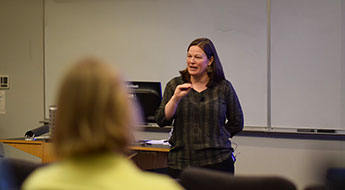Christine Percheski
Associate Professor of Sociology
PhD, Sociology, Princeton University, 2008
Sociologist Christine Percheski’s research is focused on family demography, economic inequality, and health policy. Her research is particularly concerned with understanding the wellbeing of American women and families with children. Her past work has investigated how changes in family characteristics are associated with the rise in economic inequality among U.S. households, how the employment patterns of new parents vary by their partner status, how the Great Recession affected pregnancy rates, and how health care use and insurance coverage varies by family characteristics. She has also investigated the rise in wealth inequality among families with children in the United States, including increases in racial/ethnic wealth gaps.
Percheski’s research has been published in such journals as the American Sociological Review, Demography, Journal of Marriage and Family, Social Science & Medicine, and Maternal and Child Health Journal. Prior to coming to Northwestern, Percheski was a Robert Wood Johnson Scholar in Health Policy Research at Harvard University.
Current Research
Financial Support of Siblings. This research project focuses on sibling relationships in adulthood, with an emphasis on financial and social support. For most people, their longest social relationships are with siblings and cousins. Given this, it is somewhat surprising that we know almost nothing about the dynamics of economic and material support exchanged between siblings in the contemporary United States. Because the United States has a relatively weak government social safety net, siblings may be a particularly crucial source of economic and material support during times of crisis, such as divorce, illness, bout of unemployment, or during emergency situations, such as forest fires, hurricanes, and pandemics.
Marriage and Fertility among Veterans. U.S. military servicemembers experience distinct cultural norms, employment security, and a rich social safety net compared to civilians. This project explores the marriage and family formation patterns of service members and veterans in the U.S. during the All Volunteer Era. Preliminary findings show that military service members and veterans marry at higher rates and younger ages than their civilian counterparts.
Selected Publications
Percheski, C. and C. Gibson-Davis. 2022. Marriage, kids, and the picket fence? Household type and wealth among U.S. households, 1989–2019. Sociological Science 9(7): 159–83.
Hurley, L., A. Stillerman, J. Feinglass, and C. Percheski. 2022. Adverse childhood experiences among reproductive age women: Findings from the 2019 Behavioral Risk Factor Surveillance System. Women's Health Issues 32(5): 517–25.
Percheski, C. and C. Gibson-Davis. 2020. A penny on the dollar: Racial inequities in wealth among households with children. Socius 6: 1–17.
Gibson-Davis, C. and C. Percheski. 2018. Children and the elderly: Wealth inequality among America’s dependents. Demography 55(3): 1009–32.
Percheski, C. 2018. Marriage, family structure, and maternal employment trajectories. Social Forces 96(3): 1211–42.
Percheski, C. and S. Bzostek. 2017. Public health insurance and health care utilization for children in immigrant families. Maternal & Child Health Journal 21(12): 2153–60.
Percheski, C. and R. Kimbro. 2017. Deciding to wait: Partnership status, economic conditions, and pregnancy during the Great Recession. Sociological Science 4(8): 176–95.


